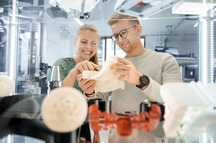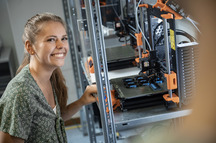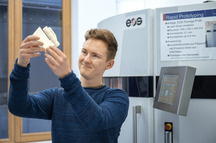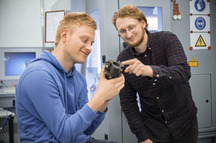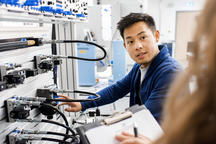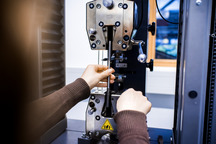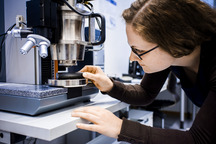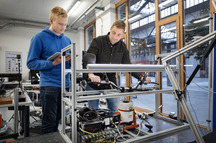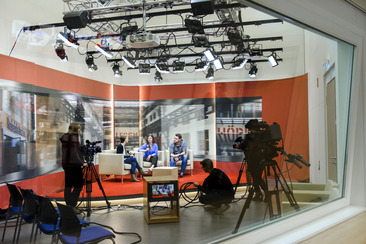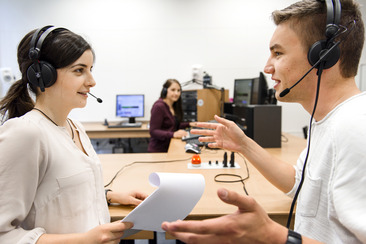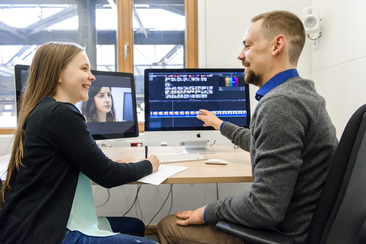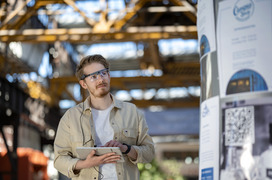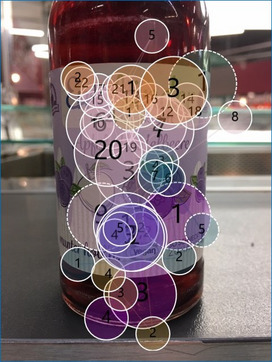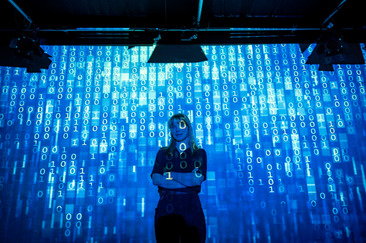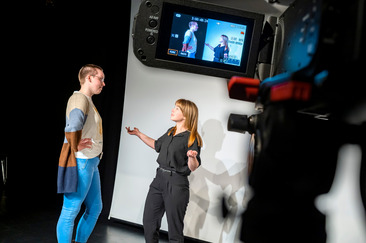Laboratories
Faculty of Management, Culture and Technology (Lingen Campus)
Laboratory Area: Energy Systems and Process Technology
The Energy Systems and Process Technology laboratory combines the scientific basics of energy systems, energy technology, process engineering and chemistry. The central focus is on key future topics such as low-CO2 energy supply concepts and process-integrated environmental protection. The basic training for the engineering and industrial engineering degree programs takes place in the departments. In addition, internships and application-oriented teaching units are offered for the specializations as well as the opportunity to do research work.
DEPARTMENTS:
The department offers a comprehensive interdisciplinary focus on electrochemistry, energy storage and polymer science. Students can complete internships and project work alongside their lectures and acquire practical experience of working in a chemistry laboratory. In addition to teaching, the department is also involved in research. In the key area of "Innovative materials and materials technologies", the research is focused on the development of polymer materials, molecular electrochemistry and the recycling of rubber waste.
Equipment:
- Electrochemical station with gas scrubbing system
- Potentiostat/galvanostat + accessories (flow through cell, rotating disk electrode Autolab RDE, battery measuring cell)
- TG-DSC coupled with FT-IR spectrophotometer
- UV-Vis spectroscopy system for "in situ" electrochemistry
- Glovebox with oxygen analyzer
- Spin coater reaction calorimeter
- Rotary evaporator
- Refractometer
- Dual screw extruder DSE 20 / 40
Location:
- Chemistry and Chemical Process Engineering Laboratory: Room number to follow
Contact persons:
This is where students deal with the model-based analysis of energy systems. The modeling tools can be used to map developments and forecasts in complex, climate-friendly energy systems in detail. Open source is mainly used and further developed in the laboratory. The modeling approach used is based on a holistic view of all elements of energy conversion and use of the technical and economic aspects.
Equipment:
- 100prosim
- Python
- oemof
Location:
- Energy System Modeling Laboratory: Room number to follow
Contact persons:
In this department, students learn about the various technologies for renewable energy generation and conversion. They can apply these technologies in practical experiments.
Equipment:
- Photovoltaic module
- Process instrumentation for measuring, controlling and regulating fill level, flow rate, pressure and temperature (MPS-PA Compact Workstation)
Location:
- Energy Technology Laboratory: Room number to follow
Contact persons:
This is where students are introduced to the relevant practical basics of process engineering. The focus is on mechanical process engineering as well as thermodynamics and fluid mechanics. In addition to fully equipped experimental facilities, fluidic measuring and analysis instruments are available for student experiments and research projects.
Equipment:
- Particle Image Velocimetry (PIV)
- Rotational rheometer
- Small wind tunnel
- Pump test rig
- Heat exchanger
- Circuit processes: Stirling engine and chiller
- Solar thermal test facility
- Particle technology: sieve analysis, sedimentation and gas cyclone
- Software for process simulation (CHEMCAD), flow simulation (Ansys-Fluent) and simulation of solar energy systems (Polysun)
Location:
- Process Engineering Laboratory: Room number to follow
Contact persons:
LABORATORY AREA SPOKESMAN & DEPUTY:
Laboratory Area: Engineering
The Engineering Laboratory area covers fundamental aspects of mechanical and electrical engineering in their practical application. Application-oriented and realistic experiments are used to complete the courses and give students a more comprehensive insight into the work of an engineer at an early stage. The sub-areas of engineering are organized in seven laboratories with the corresponding applications, with close and continuous interaction across laboratories.
DEPARTMENTS:
All aspects of 3D printing are covered here. From the creation of CAD 3D models, 3D scanners for reverse engineering and various slicer programs to a wide range of different 3D printers, all the equipment required for the practical implementation of additive manufacturing is available. Students independently realize 3D printing projects in their own "3d-fablab".
Equipment:
- Additive manufacturing systems for the SLS powder bed process (EOS Formiga P100)
- FDM 3D printer (Markforged) for long-fiber-reinforced plastic with carbon and glass fibers
- 3D-FabLab, consisting of
- 3x FDM 3D printers (Ultimaker, Prusa (2x))
- 2x SLA 3D printers (Formlabs, Prusa)
- Metal 3D printer (in planning)
Location:
-
Laboratory for Additive Manufacturing: Room KC 0105/0106
Contact persons:
Ideally, automated and controlled processes lead from modeling via simulation to real-life testing. The individual core competencies and the need for overall system expertise are demonstrated to students by examples such as autonomous driving or flying. With the help of measurement technology and special driving and flying maneuvers, route dynamics as well as driving and flying comfort can be determined. Finally, the control system for robotic systems is also designed and tested on the basis of models. The application focuses on the practical use of measuring devices, the extraction of mathematical models, the creation of a Matlab/Simulink simulation and its validation, the design of control loops and the final implementation of the control in the real process.
Equipment:
- GNSS/RTK measurement technology including IMU
- dSpace Micro AutoBox
- Embedded Systems
- Vehicle technology
- Drones: DJI Mavic Mini, Holybro S500
- Rover: AgileX Scout Mini
Location:
- Laboratory under construction
Contact persons:
The focus of research activities in this area is on highly dynamic electric drives, magnetic levitation technology and modern power electronics. Students are given the opportunity to put their theoretical knowledge in the fields of electric drive technology, measurement and control engineering, mechatronics, power electronics and energy technology directly into practice. One example here is the student electric kart project, which set a world record for the fastest acceleration in 2015.
Equipment:
- 2 electric karts
- Various motor test benches with different machines (asynchronous machines, synchronous machines, universal motors and DC machines)
- Systems for real-time programming (rapid control prototyping boards)
- highly modern four-channel oscilloscopes, power meters, multimeters, current clamps, insulation amplifiers and differential probes
- Highly dynamic motors and magnetic bearings
- Power electronics and battery test benches
Location:
- Electrical Drive Technology Laboratory: Room KC 0012
Contact person:
In this area, students are introduced to the relationships between magnetic fields, electric fields, power, voltage and current. The aim is to create a transfer between specialist knowledge from technical publications and practical experience. The focus here is on getting to know measurement technology such as multimeters, oscilloscopes and differential probes, digital and analog circuit technology and electrical/electronic components such as coils, transformers, diodes and transistors. Finally, hardware-related programming using embedded systems and FPGA (Field Programmable Gate Array) is also taught.
Equipment:
- Oscilloscope and differential probe
- multimeter
- Teaching boards for direct current, alternating current, semiconductor and circuit technology
- Embedded systems/FPGA boards
- Regulated laboratory power supplies and function generators
- 3-way tank system
Location:
- Electrical Fundamentals Laboratory: Room KC 0101/0102
Contact persons:
Students are taught basic manufacturing skills here. Realistic component geometries can be produced on a modern production system for high-speed cutting. The basic principles of material behavior are demonstrated in a practical way using modern materials testing equipment. The laboratory is designed in a way that allows students to carry out tensile tests, hardness tests, determination of notched bar impact bending work and ultrasonic measurements themselves.
Equipment:
- Production system for high-speed milling (R?ders HSC)
- Universal tensile testing machine up to 50 kN (ZwickR?ll)
- Universal hardness tester for Vickers/Brinell/Rockwell (ZwickR?ll)
- Pendulum impact tester for determining notched bar impact strength (Zwick)
- Ultrasonic measuring device (GE)
- Equipment for embedding and preparing sections (ZwickR?ll)
- Light microscope with digital image acquisition (Carl Zeiss)
- Equipment for heat treatment
Location:
- Manufacturing Processes and Materials Analytics Laboratory: Room KC 0105/0005
Contact persons:
In this area, the basics of construction engineering are supplemented in a practical way. This includes the determination of forces in statics and deformations in the field of elastostatics and strength theory. By applying their knowledge experimentally, students become familiar with the activities in their intended professional field and gain valuable experience in how to handle measuring instruments, software and the evaluation of experiments. Practical applications are taught by using hydraulic drive technology and the feed axes of machine tools. Machine dynamics studies complete the spectrum of practical applications.
Equipment:
- Test stand for hydraulic drive technology (Festo Didactic)
- Test stand for linear axes (supplier: based on Siemens technology)
- Laser interferometer for measuring feed axes (Renishaw)
- System for automation technology (Gunt)
- Test setups for machine dynamics (including Gunt)
- Experimental environment and for technical mechanics (Gunt)
- Surface roughness measuring device (Mahr)
- Thermal camera (supplier: Infratec)
- Vibration analysis system with vibration-isolated foundation (supplier: CplusW)
- Photogrammetry system for highly dynamic optical motion analysis (supplier: GOM)
- Test equipment and exhibits of various machine elements
- Test field for determining fatigue strength (in planning)
- Coordinate measuring machine for workshop use (in planning)
Location:
- Laboratory for Construction and Mechanical Engineering: Room KC 0005/0105
Contact persons:
This area offers a modern environment in which students can carry out computer-aided design processes to develop components and assemblies. Industry-standard 3D CAD systems support student work. In addition, simulation methods are used here in a practical way to analyze the behavior of components and assemblies under operating conditions and to virtually test and optimize variants. In addition, mechanical and thermal aspects are coupled with flow simulations. Topology optimization is also deployed to design products that can be implemented using additive manufacturing.
Equipment:
- PC pool with virtual machines and the following simulation software:
- SolidWorks (3D CAD system/engineering environment)
- HyperWorks (finite element analyses (FEM), topology optimizations and flow simulations (CFD))
- Autodesk Inventor (3D CAD system)
Location:
- Virtual Product Development Laboratory: Room KC 0104
Contact persons:
LABORATORY AREA SPOKESMAN & DEPUTY:
Laboratory Area: Interaction and Commuication
The Interaction and Communication laboratory brings together the fields of nursing science, drama education, market research, communication research and organizational psychology. Students have the opportunity to prepare for complex cases in their future professional practice by experimenting with simulated conversational, counseling and conflictual situations. Behavioral observations and recordings are used to promote reflection skills and expand the individual behavioral spectrum. Computer-based test procedures also enable a comprehensive analysis of human behavior in a variety of decision-making situations.
DEPARTMENTS:
It is almost impossible to imagine profitable financial management of companies without software support. In this area, students have the opportunity to apply the knowledge they have acquired in the lectures realistically in the cloud by means of case studies and to simulate management decisions. IT-related, market-related and financial contexts are illustrated.
Equipment:
- DATEV
- FitchConnect database
- Topsim
- Markstrat
Location:
-
PC combination pools: Rooms KG004, KA0004 & KA0005
Contact persons:
Students learn how to deal professionally with the media and media representatives. In the studios, students familiarize themselves with the journalistic perspective, learn the relevant tools for the production of audiovisual formats, sharpen their conceptual and assessment skills and train their professional appearance in front of camera and microphone. In addition, new digital media and event formats are developed and tested across the university in the laboratory area.
Equipment:
- Radio studio with four presentation seats
- TV studio with backdrop, green screen, stage, studio cameras, control room
- Editing suites with software for video and audio editing
- Mobile film cameras, sound equipment, lighting technology, audio recording equipment, laptops, tablets
Location:
- TV studio & radio studio: Rooms KB 0002, KB 0003 & KB 0008
- Editing rooms: Rooms KB 0104 & KB 0105
- Co-working space media and digitization Laboratory: Room KB 0009
Contact persons:
How do consumers react to various media and marketing messages? Here, students have the opportunity to observe and analyze human behavior in simulated sales situations and conversations. The focus is on advertising, packaging or rule design as well as user experience and interaction.
Equipment:
- Stationary eye-tracking system (Tobii X60/X120 with Tobii Pro Studio software)
- Eye-tracking glasses (Tobii Glasses 2 with Tobii Pro Analyzer software)
- Analysis software (Tobii & SPSS)
- Design elements for setting up experimental use cases
Location:
-
Eye-tracking Laboratory: Room KG 0014
Contact person:
Organizational psychology deals with personal, social and situational conditions of human behavior and experience in organizations. Students are offered the opportunity to conduct standardized behavioral observations and experimental studies (team and individual tests) of such conditions. In particular, the laboratory is also used to research personnel selection procedures.
Equipment:
- Experimental room and control/direction/observation room
- Group and individual workstations with partition walls
- smartboard
- Notebooks, webcams with integrated microphone, meeting microphone (in planning)
Location:
- Organizational Psychology Laboratory: Room KB 0207
Contact person:
This area stands for research into nursing activities and advice. By simulating specific nursing situations, students have the opportunity to train their skills in the areas of patient care, communication, diagnosis and complex treatment procedures.
Equipment:
- VR glasses
- Technical aids for care (e.g. rollator, Tover board, Beleaf TV)
- Reconstruction of an outpatient setting
- Software (e.g. Grips, CNE, etc.)
- Communication-supporting software and aids
Location:
-
Laboratory under construction
Contact persons:
Students can experiment with role players/role characters and explore social play spaces. Through improvisation, subtext and status work, forum and educational theater as well as theatrical coaching, the theater pedagogical intervention spectrum is promoted and expanded. Students also take part in interdisciplinary courses with fellow students from different degree programs.
Equipment:
- Projection Mapping
- Motion Capturing
- Virtual Reality Experiences
- Intermedia and immersive technologies
Location:
- Burgtheater (Baccumer Stra?e 3)
Contact persons:
LABORATORY AREA SPOKESPERSON & DEPUTY:
Laboratory area: Digitalized Value Creation Processes
In the "Digitalized value creation processes" laboratory area, forward-looking topics such as 5G and cloud infrastructures, business application systems, intelligent robotics, and the concepts of the smart factory and smart products are covered. The focus is also on logistics, advanced data analysis, artificial intelligence, machine learning, software and application development as well as virtual and augmented reality. This area aims to provide students with practical and theoretical knowledge in the digitalization and automation of value creation processes.
Brief description
The Laboratory for 5G and Cloud Infrastructure at Osnabrück University of Applied Sciences, Lingen Campus, offers students the opportunity to gain practical experience with state-of-the-art 5G and cloud technologies.
The Laboratory for Business Application Systems at Osnabrück University of Applied Sciences, Lingen Campus, combines business processes with modern IT to provide students with practical insights and skills for the digital business world.
Brief description
The Intelligent Robotics Lab at Osnabrück University of Applied Sciences offers students a unique learning environment where they can gain hands-on experience with advanced robotic technologies. Equipped with modern robots such as the Cobot UR5e, Kuka Agilus but also refurbished models such as the Mitsubishi Movemaster. Various drones also complete the laboratory's equipment. The robots' areas of application range from data processing in production environments and optimizing production processes to efficient stocktaking in unstructured outdoor areas. Hands-on experience with these state-of-the-art systems prepares students for the challenges and opportunities of intelligent robotics in an industrial environment. Competence in the operation and programming of these technologies forms an essential basis for the development of innovative solutions in Industry 4.0.
Equipment
| Nr. | Equipment | Area of Application | Link | |
| 1 | Universal Robot UR5e | Collaborative Robotics | ||
| 2 | Kuka Agilus Lernzelle | Industrial Robots: Control and Operation | ||
| 3 | Mitsubishi Movemaster | Development of own Control Systems | n/a | |
| 4 | Drohnen | Measurement Data and Operation of Drones, Image Data Processing |
Brief description
In the Digital Value Creation Processes laboratory at the Lingen campus, the Smart Factory / Smart Products area offers insights into intelligent production processes. The design and planning of such intelligent and networked production processes in the industrial sector will play an increasingly important role in the future in order to meet growing demands on the quality and individuality of the products to be manufactured. Such processes and technologies bring Industry 4.0 to life at the site and enable students from a wide range of degree courses to engage with these concepts and deepen their knowledge in a practical way as part of laboratory seminars and project work.
The Festo model factory located in the laboratory allows production processes to be carried out using modern programmable logic controllers. With this and with the help of other IoT devices, specific machine data can be extracted from the process and utilized through real-time monitoring. Basically, all essential steps from the digital order to order production can be mapped here in the dynamic intelligent production process and future-oriented production technologies can be researched.
Topics of the Laboratory Area:
- Production Processes from Industry 4.0
- MES und ERP-Systems
- Distributed IoT systems
- KI und Machine Vision
Equipment
| Nr. | Equipment | Area of Application | Link | |
| 1 | Festo model factory | Practical Learning of Automation and Manufacturing Processes | ||
| 2 | PLC (programmable logic controller) | Control Technology in Automation | ||
| 3 | IoT Devices: ?C (Microcontroller) |
| ||
| 4 | IPC (Industrial PC) | Control and Monitoring of Industrial Processes |
Brief description
In the logistics laboratory, we attach great importance to students gaining in-depth knowledge of logistics and production processes through practice-oriented methods and the use of advanced technologies. The use of specialized software solutions, such as visTABLE? for the planning of digital factories, enables students to visualize and optimize processes directly. The aim is to give them a comprehensive understanding of how to increase efficiency in logistics processes, improve production processes and optimize material flows in order to prepare them optimally for their future careers.
Simulation game
In the interactive business games, participants start with a suboptimal logistics process that they have to improve over several rounds. They compete against each other in teams with the aim of increasing process efficiency through innovative solutions and techniques such as Pick by Vision and Pick by Light. The focus is on target KPIs such as reducing waste, optimizing the layout and improving overall throughput times.
The cross-functional business game "The Fresh Connection" focuses on supply chain management and presents participants with the challenge of developing an effective strategy for the supply chain of a financially troubled virtual fruit juice producer. It provides a hands-on learning experience where students experience first-hand the complexity of supply chain management and learn how critical decisions are made under pressure.
Aim
Through realistic simulations and projects, students gain in-depth insights into the challenges and solutions of the logistics and production industry. This prepares them for a successful future career in this dynamic field by teaching them to analyze and optimize critical aspects such as material flow, production processes and logistical workflows.
The Laboratory for Data Analysis, AI and Machine Learning at Osnabrück University of Applied Sciences, Lingen Campus, enables students to work intensively with state-of-the-art data analysis methods and AI technologies in order to develop future-oriented solutions.
In the laboratory for software and application development at Osnabrück University of Applied Sciences, Lingen campus, students learn how to develop modern software and applications, from theory to the practice of modern programming methods.
In the virtual and augmented reality lab at Osnabrück University of Applied Sciences on Lingen campus, students explore the boundaries of VR and AR by developing and investigating innovative applications. They gain insight into various tracking technologies and wearables and use advanced IDEs and SDKs to program their own projects. In addition, the use of various VR and AR glasses enables them to test their applications realistically and evaluate them in terms of usability, user experience and technology acceptance.
LABORATORY AREA SPOKESMAN & DEPUTY:

